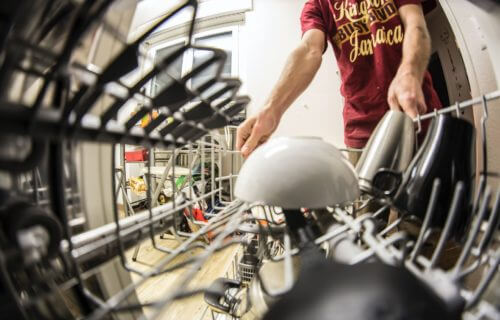ZÜRICH, Switzerland — When eating out at a restaurant, you assume you’re getting a squeaky-clean plate with your meal. However, your gut may beg to differ. A new study from Swedish immunologists found that commercial dishwashers, common in many restaurants, leave behind a chemical residue that’s toxic to the gastrointestinal tract.
Professional-grade dishwashers wash and dry loads of plates and cutlery from restaurant patrons in minutes. Typically, these dishwashers use a 60-second circulating hot water and detergent cycle at high pressure. It then goes through another 60-second wash and dry cycle where the machine adds a rinse agent. While the speed is a tremendous benefit to restaurants serving hundreds of customers in one sitting, researchers say not many washers have an additional wash cycle to get rid of the leftover rinse aid. These substances carry toxic ingredients that, when dried, can stick to plates and enter our bodies.
Knowing how commercial dishwashers operate, the study authors examined the rinse aid residue’s effects on the epithelial barrier in the gut — a layer of cells bordering the intestinal tract that controls what enters the body. A weak barrier can lead to a number of health disorders including food allergies, gastritis, chronic depression, and cirrhosis of the liver, among others.
“We assume that defective epithelial barriers play a role in triggering the onset of two billion chronic illnesses,” says lead study author Cezmi Akdis, a professor of experimental allergology and immunology at the University of Zurich and director of the Swiss Institute of Allergy and Asthma Research, in a media release.
Too much rinse aid wipes out epithelial cells
To study the components left behind in rinse agents, the team used human intestinal organoids and intestinal cells on microchips. This technology allows tissue to create 3-D clumps of cells similar to a human’s intestinal epithelium. The team also diluted the substance found in commercial detergents and rinse aids to resemble those that would be left behind on dry dishes before exposing them to intestinal cells.
Results show exposure to rinse aids put the gut barrier in dire jeopardy. At high doses, the rinse agents wiped epithelial cells from existence. While they fared better at low doses, the rinse agent residue still induced a leaky gut barrier.
Another observation the study authors noticed was the activation of certain genes and proteins that promote inflammation. The inflammatory response displayed a link to alcohol ethoxylates, one of the components of the rinse agent.
Understanding how dishwashing soap residue affects the gut brings us one step closer to learning their true danger to our health.
“The effect that we found could mark the beginning of the destruction of the gut’s epithelial layer and trigger the onset of many chronic diseases,” explains Akdis. “It is important to inform the public about this risk, since alcohol ethoxylates seem to be commonly used in commercial dishwashers.”
The findings appear in The Journal of Allergy and Clinical Immunology.





That it! I’m not doing the dishes at home either, I don’t want to be responsible for that!